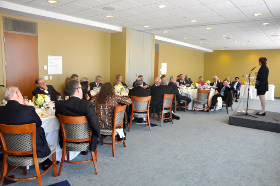Industry leaders have joined senior United Nations officials and representatives of UN-affiliated organisations for a special conference organised by CIBJO, to discuss the commitment of the jewellery and gemstone business to facilitate sustainable development in the countries and regions in which it is active. The conference was held in the Delegates Dining Room at the United Nations headquarters in New York.
The event was held in honour of a special joint session of the UN General Assembly and the UN Economic and Social Council (ECOSOC), in which CIBJO has been the gemstone and jewellery sector’s only representative with special consultative status since 2006. The session had been called to discuss the United Nations’ Millennium Development Goals programme, which is scheduled to culminate in 2015, and the Sustainable Development Goals that will succeed it.
The conference was coordinated by Dr. Hanifa Mezoui, a senior UN Senior Advisor on Civil Society, and was moderated by Dr. Francois Loriot, an MDG specialist and Vice President of the Bar Association for Inter-Governmental Organisations.
“Today’s gathering is meant to emphasise that, as a responsible business community, we must focus not only on protecting the chain of distribution and consumer confidence, but also on fulfilling our social and economic commitment to our stakeholders and the communities in which they live,” said CIBJO President Gaetano Cavalieri, opening the event. “When, as individual companies and organisations, we assess how successful we are in implementing responsible practices, we also need to consider how we have contributed to the achievement of the Millennium Development Goals and the Sustainable Development Goals post 2015.”
Speaking to the gathering, Dr. Andrei Abramov, chief of ECOSOC’s NGO section, spoke of the dramatic shift that had taken place in the United Nation’s attitude toward the business sector, shifting from one of suspicion to an appreciation that it has the operational and financial capacity to initiate and implement sustainable development programs, in a way that he public sector sometimes does not.
His words were echoed by Melissa Powell, Head of Strategy & Partnerships and Business for Peace at the UN Global Compact Office. “While we cannot ignore the fact that the private sector may at times have a negative impact upon the society, it also has a capacity to bring about significant positive change,” she said. “And we are not only talking about opportunities created through investments of financial capital, but also of skills and experience.”
Ms. Powell highlighted Global Compact’s Business for Peace programme, which was identified in Forbes as one of the five areas defining the future of CSR. It is a platform that assists companies in implementing responsible business practices in conflict-affected and high-risk areas.
Providing grass roots testimony of industry investment in sustainable development, Hayley Henning, Executive Director of the Tanzanite Foundation, described the various programmes initiated by the organisation in Tanzania, including the establishment of schools, an orphanage and economic empowerment programmes for Masai women living in the gemstone mining areas.
An online system developed in cooperation with CIBJO, which will enable jewellery businesses to incorporate social responsibility management methods without having to employ expensive outside advisors, was introduced by professors Donald Fever and Benedict Sheehy of the Branded Trust Foundation. The system, which includes supply chain monitoring and evaluates a company’s investment in social and sustainable development according to the Millennium Development Goals, will be made available for the jewellery and gemstone industry over the course of the coming year.
A new ECOSOC member with special consultative status is the International Food and Beverages Alliance (IFBA), which was represented at the seminar by Dr. Delon Human, Special Envoy to the World Health Organisation. IFBA was created in 2008 by the world’s largest food and non-alcoholic beverage manufacturers, and employs more than 3.5 million people worldwide. Dr. Human described his industry’s commitment to the United Nations’ development program, emphasising its unparalleled distribution ability, reaching more than 2.5 billion people worldwide on a daily basis.
A highlight of the event was the signing of a cooperation agreement, entitled “Global Partnership for Development” by CIBJO’s President, Dr. Cavalieri, and Jean-Pierre Diserens, Secretary General of the Council of Independent Financial Advisors (CIFA), which calls for the creation of a joint programme to educating their respective members about the United Nation’s Post-2015 Development Agenda. Mr. Diserens also addressed the conference.
“This focus on society, where we aim not only to eliminate negative elements, but also to ensure that the jewellery and gemstone industry delivers a peace dividend, is an essential part of our mission. It is what I would like to call the CIBJO Project,” said Dr. Cavalieri.
“Most importantly,” he added in conclusion, “we are committed to the wellbeing of all our stakeholders. Nobody should be left behind.”
Photo Caption: Dr. Hanifa Mezoui, a senior UN advisor on civil society, addressing the CIBJO conference at UN headquarters in New York.

